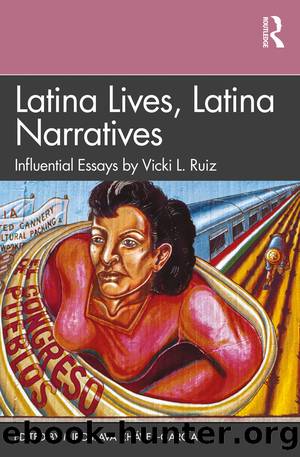Latina Lives, Latina Narratives by Miroslava Chávez-García

Author:Miroslava Chávez-García [Chávez-García, Miroslava]
Language: eng
Format: epub
ISBN: 9780367699222
Barnesnoble:
Publisher: Taylor & Francis
Published: 2021-06-28T00:00:00+00:00
7
UNA MUJER SIN FRONTERAS
Luisa Moreno and Latina Labor Activism
The years of the Great Depression and World War II stand as the golden era of the American labor movement, with the auto workers staging a dramatic sit-in at Flint, Michigan, John L. Lewis setting up a national confederation of factory workers into the powerful Congress of Industrial Organizations (CIO), and the charismatic A. Philip Randolph organizing African American railroad porters. Luisa Moreno ranks among these icons of labor history, yet her story remains virtually unknown outside of Latino Studies. Organizing briefly with Lewis in Pennsylvania and a contemporary of Randolph, Luisa Moreno remains the only transcontinental Latina union organizer, as her work, indeed her passion, carried her across the country, from the garment shops of New York City to cigar plants in Tampa to canneries in Los Angeles, with many stops in between. An immigrant from Guatemala, she was the first Latina vice-president of a major union, the United Cannery, Agricultural, Packing, and Allied Workers of America (UCAPAWA), which in its heyday was the seventh-largest CIO affiliate. But her most notable âfirstâ was as the driving force behind El Congreso de Pueblos de Hablan Española (the Spanish-Speaking Peopleâs Congress), the first national Latino civil rights assembly.
Born Blanca Rosa RodrÃguez López on August 30, 1907, Moreno had a most unlikely childhood for a future trade union leader. She grew up surrounded by wealth and privilege in her native Guatemala. Her mother, Alicia López Sarana, originally from Colombia, was a prominent socialite married to Ernesto RodrÃguez Robles, a powerful coffee grower. With the help of a coterie of servants and tutors, Alicia and Ernesto reared four children, one son and three daughters, on their sprawling estate. Luisa, receiving an education appropriate for her station and gender, spoke Spanish and French and showed an early aptitude for poetry. She remembered her father as a âreal person,â but her mother as âa peacock,â who never emerged from her boudoir until eleven oâclock in the morning. At the age of 8, Luisa was stricken with a high fever, and the local doctor offered little hope for her recovery. Her father prayed for her life, promising that he would consecrate her to God by sending her to a convent in preparation for religious life. Luisa recovered, and, true to his word, in 1916 Ernesto and his 9-year-old daughter boarded a steamship bound for California, where Luisa would attend the Convent of the Holy Names in Oakland.1
Moreno had less than fond memories of the four-and-a-half years at the convent. There she experienced her first bout with discrimination. A classmate made a remark about âSpanish pigs so I belted her.â Her convent experiences, especially the hypocrisy she witnessed during Lent, when she and the other girls subsisted on bread and water while the nuns dined on sumptuous food, turned her away from Catholicism in particular and organized religion in general. She begged to return home, and finally her parents relented.
Back in Guatemala, Luisa at the age of 15 desired a university education but soon discovered that women were barred from such lofty pursuits.
Download
This site does not store any files on its server. We only index and link to content provided by other sites. Please contact the content providers to delete copyright contents if any and email us, we'll remove relevant links or contents immediately.
Cecilia; Or, Memoirs of an Heiress — Volume 1 by Fanny Burney(32561)
The Great Music City by Andrea Baker(32021)
Cecilia; Or, Memoirs of an Heiress — Volume 2 by Fanny Burney(31958)
Cecilia; Or, Memoirs of an Heiress — Volume 3 by Fanny Burney(31944)
We're Going to Need More Wine by Gabrielle Union(19050)
All the Missing Girls by Megan Miranda(16038)
Pimp by Iceberg Slim(14515)
For the Love of Europe by Rick Steves(14149)
Bombshells: Glamour Girls of a Lifetime by Sullivan Steve(14078)
Talking to Strangers by Malcolm Gladwell(13375)
Norse Mythology by Gaiman Neil(13372)
Fifty Shades Freed by E L James(13245)
Mindhunter: Inside the FBI's Elite Serial Crime Unit by John E. Douglas & Mark Olshaker(9346)
Crazy Rich Asians by Kevin Kwan(9295)
The Lost Art of Listening by Michael P. Nichols(7507)
Enlightenment Now: The Case for Reason, Science, Humanism, and Progress by Steven Pinker(7315)
The Four Agreements by Don Miguel Ruiz(6767)
Bad Blood by John Carreyrou(6625)
Weapons of Math Destruction by Cathy O'Neil(6283)
